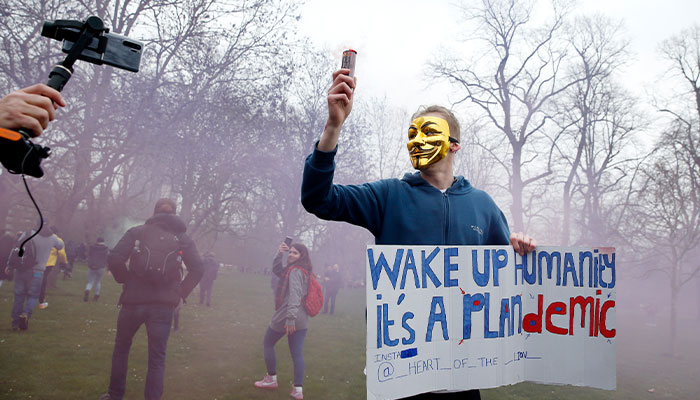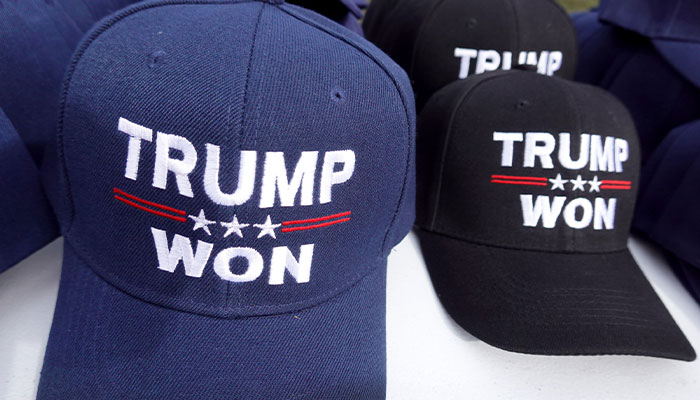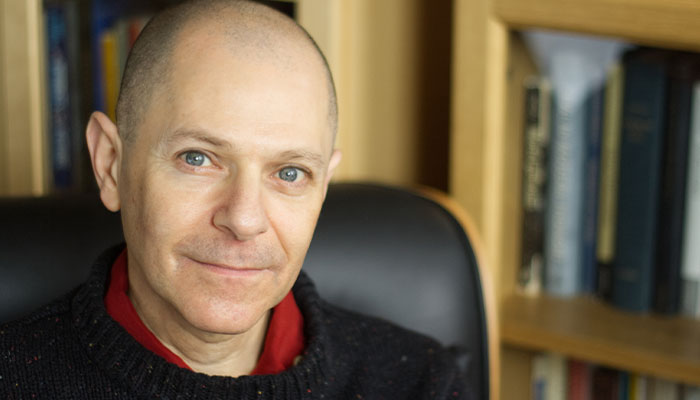When Neil Levy sat down to write a book about bad beliefs, he approached it from the conventional perspective that irrationality is the key to explaining why some people believe that the world is flat, or COVID-19 is a hoax.

Protest: The book comes at a time when conspiracy theories proliferate, including about COVID-19.
The rise of Trump and Brexit had indicated that such bad beliefs – which Levy defines as beliefs that are contrary to the consensus of people who are well-placed to know – were more common than we might have thought.
By the time COVID hit, Levy – a Professor of Philosophy – had finished his first draft. Given his interest in sciences of the mind which involved a fellowship at the Florey Institute of Neurosciences in Melbourne, it was a book about psychological biases and limitations and how they make people irrational.
But stuck in extended lockdown in Britain, and then in Melbourne, his thinking took a radical change in direction.
At a very abstract level, I have got my beliefs for the same reason as them. People I trust have told me so.
"I came to reject a lot of that – maybe lockdown sends people mad – but I don't think people are anywhere near as irrational as the consensus in psychology or in a lot of philosophy would have us believe," says Levy.
"The so-called cognitive revolution in psychology involved the discovery of just how bad people are at reasoning tasks … but I argue that rationality is not a matter of getting things right, it is a matter of responding to evidence.
"And if your evidence is bad, a rational agent forms bad beliefs."
His book, Bad Beliefs: Why they Happen to Good People, was published online in December and will be available in print early this year.
It comes at a key time, as conspiracy theories proliferate and highly politicised debates rage about climate change and, during COVID-19, vaccination and masks, all infused by a tsunami of misinformation through digital and other channels in an era now described as 'post-truth'.
"What we believe and why we believe it, is absolutely central to these debates," Levy says.
"I am not an immunologist, or climate scientist, or historian, but I hope I have accurate beliefs about climate change and COVID-19 and the Holocaust, and the reason I have those beliefs is not because I have done my own research – it is because I know who to listen to, and that is the genuine experts.
"The people who reject those beliefs are listening to different people – at a very abstract level, I have got my beliefs for the same reason as them.
"People I trust have told me so."
A crisis of trust
Instilling trust is central to making people believe accurate information, Levy says. And to be fair, he says, there are reasons why some people have come to distrust political leaders and those who are bona fide experts in their fields.

Misinformation: If your evidence is bad, a rational agent forms bad beliefs, says Professor Levy.
"Too often scientists have not communicated well; too often they have sold out," says Levy, citing the example of the scientific publisher Elsevier which in the early 2000s released six publications that looked like peer-reviewed journals but were sponsored by pharmaceutical companies.
"People with bad beliefs tend also not to trust government – and it is easy to sympathise there, because governments have a history of misinformation.
"So we have to do a lot more to deserve trust, but reversing distrust is really, really hard because once people don't trust you, if you tell them 'we are going to behave better from now on', why would they believe you? That would be irrational.
If you want to go and do your own research, but you don't have the skills to do it, it is really, really hard to know who to listen to.
"It is basically a crisis of trust in a highly polarised society."
In terms of the "good people" of his book's title, Levy says he doesn't wish to deny that a racist person is probably going to have bad beliefs about many other things as well.
However, there are many others with bad beliefs who are indeed "good people".
"If you want to go and do your own research, but you don't have the skills to do it, it is really, really hard to know who to listen to – you can be conscientious, intelligent and well motivated, and still end up with bad beliefs, because you have got your information from bad places and once you start down that path, it is really hard to turn around."
Also very influential on an individual is what their friends and family believe – "if they think Trump or Breitbart are a reliable source, you are also going to have a higher level of trust in them – and it might require breaking with your family to arrive at higher levels of trust in those sources that are well calibrated."
The power of pre-bunking
Levy does not claim to have solutions to the epidemic of bad beliefs, but he does not think it is anything individuals can change – rather, social changes are required, through institutions, policies and education systems.

Change: Professor Neil Levy says "pre-bunking" and strong political leadership can be effective in tackling bad beliefs.
"Free speech is really important and we have to reject censorship, but nevertheless we have to make sure that the provenance of information is made clear – where does this claim stem from? Is it really from the scientific community?"
Cambridge University research has shown that "inoculation" can also be effective: that is, telling people who haven't yet made up their minds that what they are going to read from anti-vaxxers or climate sceptics is not correct.
"It is also called pre-bunking – don't wait until they encounter the false information and then tell them: that doesn't seem to work. Tell them, here are the facts, you will read out there that they are not facts, but here's the mistake that meme you are going to see on Facebook is making."
Strong political leadership can also shift the dial, Levy believes, particularly in a deeply polarised society.
"In the US, if you got Republican conservatives to say 'this isn't a political issue, vaccines work, climate change is real', that would be a much more effective measure than getting an expert to say, 'here's what the science shows'."
Bad Beliefs: Why They Happen to Good People is published by Oxford University Press and is available free at Oxford Scholarship Online and in hard copy via pre-order through selected bookstores.
Neil Levy is Professor of Philosophy at Macquarie University and a Senior Research Fellow at the Oxford Uehiro Centre for Practical Ethics.






